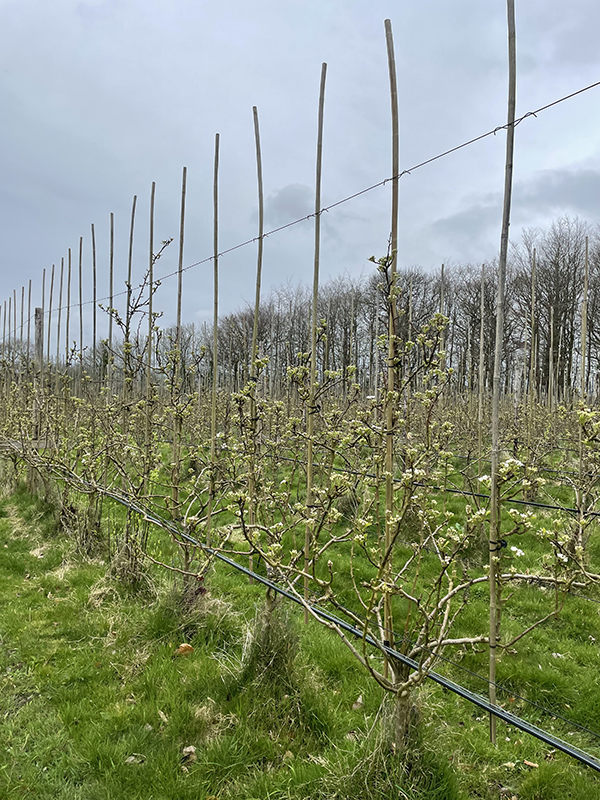High quality bioscience products with a proven track record are gaining a foothold among top fruit growers keen to explore the potential benefits on offer.The Blackmoor Estate may have been growing apples and pears for over a century, but it remains a keen adopter of new ideas and technology, underpinning its ongoing success as a producer of top-quality fruit.The family-run business, located near Selborne, Hampshire in the cool climate of the South Downs, grows 40ha of apples and pears and, more recently, cherries, mostly on upper greensand soil.The estate also runs an established tree nursery and has recently opened a cider and juice business to add more value to the apple enterprise, most of which is sold to major supermarkets and local customers.
“We’re always keen to explore new ideas and that includes our agronomy,” says fruit manager Darren Higgins. “We’ve been working with Agrovista for the past 16 years and we trust their advice to help us produce healthy trees to optimise fruit yield, quality and shelf life – we aim for 90% class 1 fruit.”In recent years, that advice has included a focus on improving the physical, chemical and biological health of the farm’s soils, encouraging soil microbiology and plant roots to work in harmony, improving crop resilience, health and performance.
As part of that, Darren is now using three new bioscience products, from Agrovista’s innovation range across all his orchards. L-CBF Boost provides a food source for soil microbiology, Phosphorus Liberator releases bound-up soil phosphorus, and Liquid Gypsum helps condition soils and improves porosity and drainage.
“It all started with a block of pears that were really struggling,” says Darren. “They came into bloom really well, but within two to three days the flowers had faded and the trees looked awful.“We planted the orchard in 2019. We didn’t do anything different and the trees had mycorrhiza treatment and slow-release fertiliser. But they were extremely slow to move – it didn't matter what we did in terms of nutrition, it was a real mystery. We were all set to grub the trees out after a couple of seasons.
“In spring 2021, my agronomist Tom Johnson suggested we try using L-CBF Boost and Phosphorus Liberator to give the soil biology a lift and provide phosphorus to encourage root growth.“When you've invested tens of thousands of pounds in an orchard and you're pulling your hair out, you're glad of any help and, in the grand scheme of things, it didn't work out very expensive.“Within three to four weeks the leaves started to improve, we started to see some tree growth and the whole orchard began to look much healthier. It was like those products had unlocked the soil.”
Darren has continued to use both products in the orchard, along with Liquid Gypsum to improve soil porosity and drainage. While yields may not be the biggest, fruit size is good, as is skin quality.
“We've seen the results of these bioscience products first hand,” says Darren. “Although we can't put hard and fast figures on it you can really see the difference – those trees would have been on the bonfire by now.”As a result, Darren is now using the three products across all the farm’s apples and pears on Tom’s recommendation.
“We didn't take too much persuading – we had seen how a few easy applications could turn things around. We have a lot of phosphorus locked up in the soil so we haven't needed to put any more on, and last year we didn't use any nitrogen on the top fruit.“We’re having to audit our soil now, so it will be interesting to see how its health improves over the years.”
Transferable benefits
Tom says Agrovista’s bioscience products are well proven and increasingly widely used in broad-acre crops.As such, he believes some or all of them deserve a place in top-fruit agronomy programmes. “They will be especially useful in a season like this, where plants have struggled in wet soils and need a kick to get them moving.“But we need to make sure the soil is in the best shape it can be all the time, making it more resilient so that plants can put down their roots without restriction and access all the nutrients they need.”
L-CBF Boost should be applied once growth begins, with subsequent applications every six weeks. “We end up with three or to four applications, providing a constant food source for soil biology during the growing season,” says Tom.Phosphorus Liberator is applied in March. “Phosphorus is often unavailable to the plant as it binds readily to aluminium or iron in acid soils and to calcium in alkaline soils.“This is a very useful product, unlocking phosphorus on a wide range of soils. It is particularly valuable on high P index soils, which may no longer require additional bagged fertiliser.”Liquid Gypsum is also applied once a year in the spring on soils with a high magnesium:calcium ratio. “With the other two products we target the soil around the tree rows, but with Liquid Gypsum I prefer to treat the whole area, including the grass in the alleyways,” says Tom.“This can help the soil to travel better, reducing the impact of traffic in more adverse conditions.”All three products are tank-mixable and applied through standard nozzles, he adds, or they can be run through fertigation lines.
L-CBF Boost
Food source for soil microbes and fungi
Improves nutrient availability and cycling
Supports long-term building of soil organic matter
Phosphorus Liberator/Phosta
Important element for tree growth and development
Displaces locked-up phosphate so it is available for plant uptake
Improves soil health
Liquid Gypsum
Aids flocculation, bonding soil particles together to form aggregates
Improves soil porosity, workability and drainage
Especially useful in soils high in Mg
Improves soil structure and soil health


